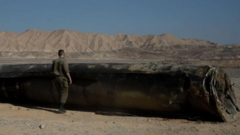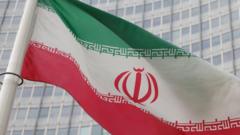The ongoing negotiations between the Trump administration and Iran highlight a critical dilemma similar to challenges faced by previous administrations. The choice to permit Iran to continue its uranium enrichment could be necessary to avoid a breakdown in talks and the specter of renewed conflict in the Middle East, amid pressures from both domestic and Israeli hawks.
Trump Faces Tough Choices in Iran Nuclear Negotiations

Trump Faces Tough Choices in Iran Nuclear Negotiations
As President Trump navigates the complex waters of Iran's nuclear program, he must weigh the risks of allowing nuclear fuel production against the potential for conflict.
In the intricate dance of diplomacy, President Trump and his envoy Steve Witkoff are confronted with a stark reality: to halt Iran's nuclear weapon ambitions, the U.S. may have to permit the continuation of some uranium enrichment. This predicament bears a striking resemblance to the negotiations that unfolded under President Obama, who ultimately allowed limited enrichment to pave the way for an agreement.
Before pulling out of the 2015 nuclear deal, which Iran adhered to, President Obama faced intense criticism, particularly from Republican lawmakers and Israeli Prime Minister Benjamin Netanyahu, who called for an end to the agreement. Now, Trump finds himself in a similar position, facing a surge of opposition from hardliners in Congress and abroad, urging a complete dismantlement of Iran’s nuclear capabilities.
Wendy Sherman, a lead negotiator for the Obama administration, noted the familiar pressures emerging in the current discussions, with key figures insisting on zero nuclear enrichment from Iran. As the stakes rise, Trump must navigate a course that balances national security interests against an escalating conflict that could unfold should negotiations fail. The decisions made in these critical talks could have lasting implications not just for U.S.-Iran relations, but for the broader geopolitical landscape in the Middle East.
Before pulling out of the 2015 nuclear deal, which Iran adhered to, President Obama faced intense criticism, particularly from Republican lawmakers and Israeli Prime Minister Benjamin Netanyahu, who called for an end to the agreement. Now, Trump finds himself in a similar position, facing a surge of opposition from hardliners in Congress and abroad, urging a complete dismantlement of Iran’s nuclear capabilities.
Wendy Sherman, a lead negotiator for the Obama administration, noted the familiar pressures emerging in the current discussions, with key figures insisting on zero nuclear enrichment from Iran. As the stakes rise, Trump must navigate a course that balances national security interests against an escalating conflict that could unfold should negotiations fail. The decisions made in these critical talks could have lasting implications not just for U.S.-Iran relations, but for the broader geopolitical landscape in the Middle East.





















